#what is the geology of north america
Explore tagged Tumblr posts
Text
the problem with building out america's rail network btw is that it's privatized and there will never be a corporate incentive strong enough or backed enough to implement effective, accessible, AND privatized countrywide travel. nationalize railways deliver on the demands of railway workers and most importantly respect indigenous sovereignty/include indigenous design input when plotting routes
#and a million other things mostly to do with geology but in terms of politics and morals this is what im going with as far as a snappy#summary of 'the problem'#however geology elaboration: america is So hard to build railways across because our most populated areas along the west coast#(where most of the rail drought is; rail PRICING on the east coast is a whole nother thing)#are stupid mountainous. the california hsr plan is spending several million more on the rail line bc they gotta plan around a mountain#and the problem gets worse the farther north you get on account of the cascades and ESPECIALLY the region around shasta#in another life i was a seismic engineer. anyway#i'm looking for a papers or other peer-reviewed content on the history of american rail labor#if anyone has favorites send them my way cause all my research is locked on california and the pacific coast more broadly#'research' my font of pdfs i downloaded from ILLs lol
35 notes
·
View notes
Text
Riders on the Storm
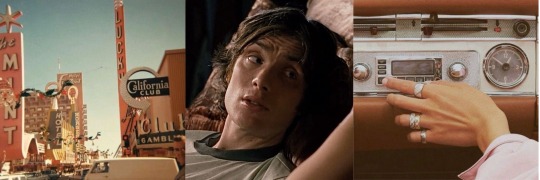
Neil Lewis x Reader
Summary: you decide to pick up a hitchhiker, he gives back a generous payment.
Warnings: car sex, semi-public sex, I misuse the geographic term of badlands(sorry geology lovers), p in v, unprotected sex
Word Count: 2.8k
A/N: don't pick up hitchhikers please, this is fiction, i hope you guys are smart enough to already know this...


Eight hours. That’s how long you’ve been cruising through the badlands of North America. At some point the eyes, after staring at the same scenery for so long, start playing tricks on you. They are small tricks. Inconsequential, even. A ploy to entertain you made by your own brain. Yet, they are just enough to piss you off, drive you a little crazy. You’ll see something flash across the road, a black blob that never existed, maybe a cactus in the distance that when you look away and then back is gone.
That’s what you think Neil is initially, another one of the tricks being played by your mind to fill some space, but he doesn’t disappear when you get closer. In fact, he gets all the more real as you approach. Arm stretched out in front of him, thumbs up, a hitch-hiker, clad in a pair of dusty jeans and a off-white tee, backpack slung over his shoulder. How long has he been out here? How dehydrated is he? Who hitchhikes anymore? You roll down your window and stop your car in front of him.
“Where are you going?” Neil asks, before you can get a word out.
You debate telling him a fake destination, you never know who’s out there after all. There’s a look of loss and sorrow in his eyes that makes you pity him, almost like a kicked puppy. You decide to tell him the truth.
“Vegas.”
“Well, I’m headed down that way too, not as far, I just need you to drop me off in Salt Lake City,” Neil pleads. He’s got these big blue watery eyes. How could you say no? “I’ll pay for gas?”
“Get in,” you sigh out, unlocking your car.
Neil looks enthralled by the news, basically running over to the passengers seat and hopping into the car. You put the car back into drive before speeding off from where you first met and picked up Neil. He introduces himself to you, and out of courtesy you do the same. Soon enough the car settles into an almost awkward silence, quiet beside the car’s radio softly playing music. Neil stares out the window, hugging his backpack to his chest.
“So, why are you going down to Vegas?” Neil asks, breaking the silence.
You jump up a little, thinking that he had fallen asleep.
“Bachelorette party. Why are you going to Salt Lake?” you hum, trying to play your previous surprise off.
“They’re hosting a pokemon tournament down there,” Neil smiles, seeming to find the contrast between your two respective reasons amusing. “Is it your bachelorette party?”
“God, no,” you say, shaking your head.
Neil seems to find your response even more amusing, starting to laugh. His laugh was warm and spread throughout the car, leading you to join him in his fit of amusement.
“What do you even do at a pokemon tournament?” you ask, once you’ve gained more composure.
“Battle it out with cards,” Neil states, only leading to him bursting out in more laughter.
You watch him out of the corner of your eye. The way his eyes crinkle up as he laughs, and how he throws his head back.
“What do you do at a bachelorette party?” Neil retorts, shaking his head trying to stop himself from laughing again.
“Get drunk and, if I’m lucky this weekend, get laid,” you respond, increasing your speed back up to the speed limit.
“Well, it seems we both have equally exciting endeavours this weekend,” Neil says, reaching over to just barely increase the music so that it’s audible as you talk.
“Yours is far more exciting than mine,” you joke, rolling your eyes. “Actually, can I ask what you’re doing hitchhiking down to Salt Lake?”
“Uh- yeah… My car broke down about a mile back from where you picked me up. It was a piece of shit that was already giving up on me before I took it on the interstate. I was like halfway to the city, in the middle of nowhere, when it just started to slow to a stop. I heard some sputtering from the engine and before I know it I’m just stopped on the side of the road,” Neil pouts as he tells you the story, letting out a deep sigh accompanied with the shake of his head when he finishes it up.
“I’m sorry. Do you know how you’re planning on getting home then?” You ask, now genuinely worried about your passenger princess.
“My friends are going to drive me back up, no worries,” Neil offers you a smile, seemingly charmed by your worry of him.
For the next hour, you and Neil let the radio of your car do most of the talking. This time it’s a comfortable silence that settles. The initial fear of him murdering you on this deserted road slipping away as the minutes pass. If he wanted to murder you, he would’ve already!
“Can we pull into the gas station, I’m running low,” it’s not really a question, you’re just telling him why you’re veering off the interstate.
Neil hums out in response, seeming to have fallen asleep, or in an adjacent state, during the hour or two gap of silence. He stretches out, making sure not to inch too much into your own personal space, then rubs at his eyes.
“Sleep well?” you tease, only earning a soft grunt in response.
You pull into one of the pumps, turning off the car and hopping out of your car, towards the pump. Neil follows you slowly. You quirk an eyebrow at the man, but he just ruffles through his backpack. Once he’s pulled out his wallet he locks eyes with you, staring blankly for a few seconds at your confused expression.
“I promise to pay for gas,” Neil deadpans, fishing his credit card out of his wallet.
“I thought you were joking.”
“Why would I be joking about that?” Neil inserts his card into the machine attached to the pump before you can even respond.
“Neil you don’t have to,” you say, tilting your head in pity.
“Well, I don’t know how else I could repay you for a favour this big,” Neil starts to fill up your car.
“I’ll get you snacks, a drink maybe? I can’t let you pay for gas, it’s so expensive,” you're almost whining as you say this, stamping your foot lightly.
“Fine,” is all Neil says in response.
You wait for Neil to finish filling up your car, leaned up against your car, arms crossed. It’s almost embarrassing that you’re just letting some stranger pay for your gas, but you can’t complain about the view he’s giving you. His bicep flexed as he held the oil pump, looking around at the scenery. Back turned to you for a moment, and you can see the bones and muscles of his back move around as he stretches briefly. Then, you get to admire his smile as he puts the pump back and removes his card.
“Do you want to go in now?” you ask, watching as Neil puts his card back into his wallet.
Neil nods, and you lock the car before heading over to the small convenience store attached to the gas pump. You and Neil split up, seeming to have different priorities when it comes to snacks and drinks. Caffeine is what you desperately need to complete the next eight hours of this trip, so you wander over to the energy drink section. You settle on a pacific punch monster, before turning your attention to a snack. Something light perhaps? No, you’re starving. Gas station food is never the best, and you likely wouldn’t have eaten anything here if you noticed earlier. Alas, you were too busy focusing on driving and now you must settle.
It seems that Neil was also relatively hungry, as you found him in the refrigerated food section. A Dr Pepper tucked under one arm, and a bag of puffy cheetos under the other. He gives you a polite smile before going back to browsing.
You decide the best option here is a sandwich, picking it up and then going around to wander until Neil is finally done. Sometime along the way you pick up a sweet treat, and stack that in your small pile of three.
“I think I’m good now,” Neil says, walking over to you with two taquitos now added to his collection.
You insist on paying for both of you at the cash register, much to Neil’s chagrin, and head out to the car. Situating both of your drinks in respective cup holders before heading back onto the interstate. Sandwich you bought is situated in one hand, the steering wheel in your other. The sandwich is truly nothing to write home about but it satisfies your persistent hunger enough. It’s about three fourths of the way through the sandwich that you notice the dark clouds looming ahead of you. You’ve never been a huge fan of driving through storms, but maybe you’ll get lucky and this one will be light. A sprinkle of rain before clearing out for the rest of the trip.
Neil opens up his Dr Pepper, breaking the silence in the car. He utters out a soft sorry before he’s gulping down the drink, washing down the taquitos he just ate.
“Were the taquitos good?” you ask, taking a bite of your own food.
“They’re good for gas station food, never really have to worry about them,” Neil replies, wiping his upper lip off from the Dr Pepper residue.
You him out in response, mouth full of gas station sandwich. There’s now a soft pitter patter of rain hitting the car.
“Hope it doesn’t get any worse,” you pray around the sandwich.
“I mean it looks like it might…” Neil muses, quickly adding on a ‘but I don’t think it will!’ when he notices your eyebrows furrow.
Unfortunately for you, Neil was right. It had gotten so bad that you didn’t feel comfortable driving, pulling over on the side of the road to wait this out. Luckily for you, this gave you time to snack on your little treat. Unluckily, you were now stuck in a car for God knows how long until conditions got better.
Thunder rumbles outside.
“Yknow, because you bought me food, I feel like I didn’t repay you enough,” Neil frowns, stuffing his cheetos into his bag, seemingly not up for them anymore.
Maybe it was the long drive both ahead and behind you, or possibly being stuck in the rain. Could’ve even been the gas station sandwich you had just finished. Yet, for some reason, you replied to Neil’s small statement with:
“I got a way you can repay me.”
Leaning over the centre console, eyes fluttering closed. There's a small pause, and for a moment you feel like Neil’s going to reject you, laugh this weird situation off completely. Then you feel his lips on yours. It takes two seconds before you feel like you two are melding together. Your whole body feels fuzzy and warm, despite the rain pouring outside and the blast of the A/C. Neil breaks away for a second, panting. His pupils are wide, almost engulfing the blue iris of his eyes fully.
“We should move to the back,” Neil suggested, tilting his head towards the backseat.
You climbed over the centre console and into the backseat, Neil following you over as soon as you were seated. Once he too was seated, he placed his hands onto your thighs. Rubbing his hands up and down the exposed skin. He looks at your thighs for a couple seconds before looking back up at you. One of his hands goes up to cup your cheek, bringing you closer to his own face. Softly, a brush against the area, he places a kiss on both corners of your mouth, then kisses you again.
Neil eventually drags you into his lap, or as close as you can get to sitting in his lap while cramped in a car. You sip your tongue into Neil’s mouth as he gives your thigh a squeeze. You moan into his mouth, your own hands navigating their way down his chest and to the hem of his jeans as Neil works up your thighs to the hem of your shorts.
You both hopelessly fumble with the other's pant button and zipper. Now just a mix of soft moans, sweaty hands, and tongue. You’re able to push Neil’s pants down to his knees first, leading you to help him slide your own shorts down. Both of you pull away from the kiss to admire the other, and just as a treat for Neil, you slip your shirt off exposing your lack of a bra. Neil’s eyes widen as he admires your body, stopping himself midway through taking off his pants to do so. You palm at the bulge in his underwear, trying to encourage him to finish taking his pants off. Which is surprisingly successful.
Thunder crashes in the distance.
Neil starts trailing soft kisses down your neck and collarbones as he plays with your breasts, massaging them and tweezing at the nipples. You let moans slip into the air of the car. The windows have started to fog up, giving you slight peace of mind that no one who passes by would likely be able to see either of you. Though, with how hard the rain is coming it would be hard to see anything.
Lightning illuminates behind you.
You move to take your own panties off, hoping it will be enough to get Neil to just fuck you already. Pushing his hands and lips off of you before leaning back into the leather seats of your car before spreading your own lips with your fingers to expose your wet cunt. Locking eyes with Neil. He lets out a sigh, shaky and needy despite the fact that no one is touching him. He stares hungrily at your cunt, licking at his lips.
“Fuck baby,” Neil pants out, slowly taking off his own underwear.
His cock slaps against his stomach once freed. It's thick, not so much long, but very thick. You can’t imagine just how good the stretch is going to be once he's inside of you.
“Go ahead,” you urge, you’re sure you're wet enough that he doesn’t even need to finger you.
“Are you sure?” Neil asks, eyebrows furrowed. His face seems genuinely worried, but the head of his cock is already lined up to your entrance.
You roll your eyes and nod, and not a second goes by before Neil pushes his cock into you. The intrusion alone makes you see white for a few seconds. You let out a small yelp, he’s so thick. He pushes himself to the hilt immediately, letting out a groan as your heat encloses tightly around his cock.
“So tight and wet for me,” Neil moans out, placing a hand on the seat to stabilise.
“You’re so thick,” you whine, squeezing your eyes shut for a moment desperately trying to adjust to his girth before Neil starts moving.
Neil gives you a couple more seconds before he’s slowly pumping in and out of you, consistently spearing you on his cock. His is definitely the thickest cock you’ve ever had the pleasure of being split on. Devastating to know you didn’t even have to get to Vegas to get the best dick of the week.
Everytime Neil rocks back into you, you let out a small squeal. Somehow each time he comes back into your cunt, he feels almost just as thick as when he first entered you. As he thrusts into you, building a steady pace, you seem to get wetter. Making the task of taking his cock a little easier, but also building a small puddle of your slick onto your leather seats. His cock glides across your sensitive spots each time, before his tip presses into your g-spot.
Neil is panting above you, alternating between closing his eyes in pleasure, staring at his own cock coming in and out of you, or looking at your own expressions of pleasure. Your moans fill up the air in the car as your hands scratch at the seats for purchase.
Neil’s pace starts to increase, soon becoming rapid enough that you bump your head on the door of the car once. You wrap your legs around his hips, head becoming fuzzy as your own high is rapidly approaching.
“Gonna cum, Neil, gonna cum,” you babble out, reaching down a hand to rub at your clit.
“Me too. Pretty girl, where do you want it?” Neil gasps out, placing both hands on your hips forcing you into a position to take him in deeper.
“Tummy,” you groan, feeling your high on your heels.
You cum around Neil’s cock, screaming out his name as you see stars. Neil pulls out of you, disappointing you only slightly. Ropes of cum land on your tits and stomach. Soon enough both of you are coming down from your high, Neil slumping against the door adjacent to you.
That was definitely payment enough.

Taglist: @paradiseprincesss @luluartpop @xanaxiii @galactict3a
#Spotify#neil lewis x y/n#neil lewis x you#neil lewis fanfic#neil lewis smut#neil lewis x reader#neil lewis#watching the detectives#cillian murphy smut#cillian murphy fanfiction#cillian fanfic#cillian fic#cillian murphy#cillian x fem!reader#cillian x reader#cillian x y/n#cillian murphy x y/n#cillian murphy x reader#dstryvampres
296 notes
·
View notes
Note
I always hear about the ecosystems that are more biodiverse than expected, like grasslands, deserts, rivers. What ecosystems are less biodiverse that most people expect? Or do all ecosystems have a lot going on?
forests!!!!! i don’t wanna shit on them lol but it’s kinda funny—you go from rainforests, which are a hotbed of biodiversity, to places like the redwood forest or northern coniferous woods which are just…. strangely silent.
in the case of northern coniferous woods (like in parts of alaska), the geology contributes to it. only certain species can survive in geologically active areas with poor soil quality—conifers (pine, spruce, larch) LOVE that shit. in the case of the redwoods and other more southern but still northern forests (loll!! think oregon coast), there’s only so many species that can survive in those poor-quality soils that are constantly wet thru the year. again, wooo conifers!!
the redwoods though are specifically interesting… dense canopy leads to fewer plant species able to grow, which means there’s less food for other animals. if you ever get the chance to visit redwood national park, be silent and listen for a bit. there’s a noticeable lack of insects and birds. all of that goes together!!
that being said—there are some studies being done on the redwood canopies. there are specific fern and moss ecosystems that ONLY grow on those trees, and due to habitat fragmentation it’s pretty hard to gather info on them. these things grow on a scale of hundreds of years, so many of them just don’t exist anymore.
also, though, on the other side of the scale—the southeast US is STAGGERINGLY biodiverse. that part of north america mirrors southeast asia, both are considered rainforests (in parts lol). interestingly, too, there are a lot of species that are very similar despite being separated by the pacific ocean.

example: american beautyberry vs asian beautyberry!!
also, shout out to central texas for being a biodiversity hotspot <333 i will forever maintain that the hill country is one of the most special places in the country!!! old oaks, sycamores, pecans, and bald cypress (best tree) lining the rivers—cliffsides covered in trees, amazing diversity of insects and reptiles, riverside flood plains, native tall grass prairies—it’s amazing!! i’m biased though obviously lol!!
98 notes
·
View notes
Text
I see your rift lakes and raise you burping/farting lakes (forgot the science name). They store carbon monoxide and when they "flip" the gas at the bottom comes to the top, suffocating everything within a few miles or more that's under about 4 feet tall. Livestock, wildlife, kids, sleeping people… There's one by a city of millions right now, just building up its gas reserve. They're mostly in Africa, but still, creepy things. There was a village where the lake did its turnover in the middle of the night and that village isn't around anymore. A few people survived to tell others about it and that's a big part of how we know this happens. You can look up pics of one place where lake turnover killed a ton of livestock, it's eerie as hell.
You know what scares me? REALLY scares me?
Rift lakes.
#death tw#geology is freakier than you think#anyway I'm high on migraine meds and rather out of it#so don't mind me being a tremendous nerd#y'all know I have a curiosity about disasters and shit like this heh#there's some cool documentaries about these lakes out there I bet they're on YouTube#lake turnover is the name of the gas releasing event#but I can't remember what these specific lakes are called#they exist near and around volcanoes#none in North America or Hawaii that I've ever heard of though#mostly just in Africa
27 notes
·
View notes
Text
Did you Know
Mammal bias isn't the only one when it comes to researching nature and deep time?
There are more!
There is also time bias! As I have discussed with @quark-nova, Essentially, because the more recent something is the easier it is to learn about - more remains of things, more details from the rocks, etc. - we also have ridiculous amounts of bias towards more recent times. This is clearest when it comes to the traditional geologic time scale - the further back you go, the longer time periods are, and nothing is divided particularly evenly. I would even say the "anthropocene" is the biggest offender in this - if we zoomed out from today to a hundred million years ago, all of the extinctions and chaos of the past 2.5 million years would get lumped together into one big mass extinction, not separated out into nitty gritty and frankly narcissistic time slices.
Then there is geographical bias! You'd think people studying the whole biosphere wouldn't have this, but we do! Thanks to *colonialism!* The geologies of North America and Europe are significantly better studied than the rest of the world, which is fighting hard to catch up. This even extends to our knowledge of modern life, with many new species still being discovered in "the global south" (I personally prefer the term Gondwana, but what can you do). And we have no one to blame for that but ourselves.
And another one is land bias! Because we are land organisms, we tend to think about land ecosystems more than oceanic ones - in fact, the ocean only really gets enough time on it in the early stages of life, everything before the Silurian, because there isn't a land ecosystem to focus on more! But the oceans are just as influential in our past - honestly, moreso - than land ecosystems, even today - think about how much El Niño affects us all! But how many people know about the end cretaceous extinction, and not the mesozoic marine revolution? How many people know that reefs at the end Cretaceous were just, made by bivalves for some reason? The list goes on.
Then there's the one most people know about already - megafaunal and charismatic bias! This often goes hand in hand with mammal bias, but essentially, because we ourselves are megafauna - I know we specifically define megafauna to exclude humans, but how the hell is that logical - we operate on a big scale, at any rate - we tend to favor megafauna in our knowledge of the past and our understanding of life. And, if its not megafauna, it at least has to be charismatic - cute, extra weird maybe, or familiar. This affects modern research so much, especially conservation and research funding - not just paleo, but also neontological work. Charismatic Megafauna get everything, and everyone else gets scraps.
This is just the tip of the iceberg! All scientists bring in bias - that's why we need as many scientists as possible, so we have as many perspectives as possible to come up with the most parsimonious and universal view of nature - but some biases are fairly universal for humans and need to be murdered in our heads by all of us. Why did Wingspan and Holotype both start with North America when the best birds are in South America and the best fossil dinosaurs are in Asia? The list is infinite.
The biases we have because of the way history has played out, the way preservation works, and because of what kind of organisms we are as humans, are ones we all have to work to disassemble and deconstruct in our brains. The more we do so, the more we can look at the big picture, understand our entire biosphere, and work together to protect it.
Plus, imagine how much cool stuff we'll learn about when we finally take the time to do so.
We have nothing to lose but our chains.
306 notes
·
View notes
Text
Brilliant - Scott Lang X Female (Daughter) Reader

Title: Brilliant
Scott Lang X Female (Daughter) Reader
Additional Characters: Natasha, Steve, Bruce, Wanda (Mentioned), Thor, Hope, Cassie (Mentioned), Hank Pym (Mentioned), and Tony Stark
Requested by: Anon!
WC: 2,893
Warnings: Reader has a huge love for ants, ants facts, Tony being Tony, alcohol mentioned, Reader's super smart, Reader's mentioned to be a kid in homeschooled college, slight family angst, brief mention of Reader punching a kid, sarcastic reader, banter, and family fluff
The best word to describe your life was 'chaos.' Chaos was your life. But not for a while, in the beginning, your mother and father; Hope and Scott, said that you were a good baby and toddler. Yes, you cried and threw some tantrums like any other child would, but it wasn't until you were around six that Hope and Scott realized how very similar you were to your grandfather, Hank Pym. It started off small, noticing a few things here and there, but it wasn't until your seventh birthday that they both knew that you were going to be just like Hank.
Looking back, it was a bright, sunny day. It was warm out, not too cold and not too warm; perfect weather for a birthday. Your first-grade friends were playing in the backyard, swinging on your swingset, and some playing tag with each other, but you were nowhere to be found.
Scott had panicked slightly when he checked around the backyard, while also trying to entertain three kids with a magic card trick. His eyes filtered around the backyard, until he spotted you, in the corner, staring at the ground. Scott found it a bit odd, thinking that you were just a bit shy and didn't want to play with your class friends... So he let it slip his mind.
But, Scott knew something was up once you blew your candles out.
"Good job, honey! What did you wish for?" Hope, your mother asked, as you just started at the cake before you.
"I want an ant farm."
From then on, it seemed like your ant fascination skyrocketed. It became such a big part of your daily routine that Hope and Scott weren't sure what to do with you anymore. It was literally taking over most of your life as the years went on. You began only wanting things that were related to ants. Posters, books, an actual ant farm, and more. You had even started up a lemonade stand to get money to buy more books about ants. Hope and Scott thought it was cute that you were making lemonade for the people of New York who would occasionally walk by the house; Hope thought that it was a great experience to help you in the future with any jobs you might get.
However, Hope and Scott began to notice that instead of getting regular kids' books about facts on ants, like 'Ten Fun Facts about Ants,' or ‘Annie and her Friend Ant,' you were going to bookstores, and leaving with 'Ants of North America; A Guide to the Genera,' and 'Identification Guide to the Ant Genera of the World.' Along with you, at the age of six and seven, reading college-level books and novels, you had become mighty close with your grandfather Hank.
You obviously loved spending time with him, since he would tell you about ants and the history and evolution of the world. That didn't stop you from getting lost every single day; that and the fact that you liked to pretend you were an explorer and explore new places, sometimes even in Central Park; hoping you could one day find a new ant species.
At the age of ten, you had become a spitting image, personality-wise, of your grandfather. You were as witty and sarcastic as you were incredibly wise beyond your years. Incredibly wise to the point that Hope and Scott thought it was best to take you out of grade school and set you up with college classes at home, where Hope could teach you. And it was totally not also because you punched a kid in the face after he said that Ant-Man was the worst Avenger.
Along with your new college schedule at home - where you learn about geology, calculus, quantum mechanics, and so on - you did end up with a lot of free time, which allowed you to go to "work" with your father. Which was where you had met most, if not all, of the Avengers.
~~~
Scott held your hand as you went up and up in the Stark Tower elevator. He let out a big sigh, becoming a bit nervous, as he glanced down at you. "You're going to behave, right?"
You simply looked up at him, one of your favorite ant books in your free hand. "Of course. Why wouldn't I behave?" You asked, sarcasm lacing your words, before looking back at the book.
"Yeah, well, I just don't want you to bombard them with ant facts," Scott responded, before shaking his head slightly and looking forward again.
"That will be inevitable, Dad," You replied, looking forward as well, "I can't just not speak about the things that I enjoy in life. Ants bring me such joy that is beyond words, and I want everyone to know about my passions."
"Well... I guess just don't go overboard then," The elevator doors began to open, "I do love that you have something that makes you happy but I don't want you to tire them out. We have to make a good impression on them. You know I haven't met some of them yet - out of the battlefield, I mean." Scott spoke, letting out a sigh.
"You have to try and make a good impression. I don't have to try, I'm always going to succeed." You replied, before stepping off the lift and walking towards the common room, with Scott trailing behind you.
As you entered the common room, about seven sets of eyes landed on you. Some in shock, or so on, before they trailed up to see Scott.
"Hey, guys! Uh, this is my daughter. Y/N, say hello!"
"Say hello." You replied with a short roll of your eyes before you walked over to the first nearby person. Offering your hand with great conviction, "My name is Y/N Lang, I prefer Y/N Pym, but please, call me Y/N. It's a pleasure to meet you." At your words, Scott felt his heart fall to the pit of his stomach. It was nice that you were indeed so close to your grandfather, but for a long time, Scott had felt a strain on his and your relationship for the longest time.
The redhead blinked, slightly shocked before shaking your hand with a smile, "Pleasures all mine, Y/N. My name is Natasha, but you may call me Nat."
"That sounds satisfactory. Did you know that there are over twenty-thousand different types of species of ants in the world?" You asked as Natasha dropped your hand, staring up at her expectedly.
Natasha's eyes widened slightly as she shook her head, "No, I didn't know that. But that sounds fascinating."
“Wow,” Bruce spoke up, “She’s just like Pym.”
"It obviously is. Now, if you'll excuse me." You replied before moving along to the next person. Staring up at the man, you offered your hand, "I'm Y/N. But you must have already known that. Since you are around fifty-seven inches away from Ms. Nat. So, I believe that I do not have to repeat myself. Did you know that ants do not have ears?"
Steve gave you a small smile, shaking his head, "It's nice to meet you, Y/N. I'm Steve. Uh, and I did not know that. That's very cool."
And so, you went along, speaking to Bruce, then to Wanda, and then to Thor.
And then he came in.
"Hey! Thumbelina! Didn't know you were visiting." Tony walked in, pausing once his eyes landed on you, "And you brought your kid, that's fun." He spoke, walking over and offering you his hand. "Hey there, kid, I'm Tony. You may know me for my amazing persona as Iron Man. You know, saving the world and all."
You just stared up at him, glancing at his hand with a frown, "You can never trust a Stark."
Letting out a laugh, Tony withdrew his hand, gesturing to you as he looked at Scott. "Well, Lang, your daughter's a smart kid alright."
"Yes, she is. Very smart." Scott chuckled, placing his hands on your shoulders before you swerved out of his grasp, glaring quick daggers at him before you turned your gaze back at Tony.
"That is correct. I am rather intelligent. But, it is only my grandfather and I that are intelligent." You remarked, giving Tony a slight smirk.
Tony laughed, "You're mighty sure of yourself there, aren't you? I don't mean to toot my own horn, but I have my own millionaire business, created my own suits, and am the lead Avenger. I am rather smart too."
"So you tell me, Mr. Stark. Are you sure you're worthy of that title? As lead Avenger, I mean." You asked sarcastically.
"Of course," Tony answered with no hesitation. "If anyone is deserving of being called leader of anything, it's me."
With a small snort, you folded your arms across your chest, nodding. Setting down your ant book on the coffee table beside you - with that, Scott knew you meant business - staring up at the man. "After all, when I can watch the news when I am not studying, by my previous calculations, you only pull twenty-two percent of your weight in most of your battles in the past seven years. That puts you closer to the bottom than any other Avenger."
"So," Tony retorted quickly, a grin still on his face, "You're what? Nine? How would you be able to make those calculations?"
"I have a photographic memory." You answered, "I've remembered everything I've read and seen ever since I was four."
"Well," Tony began, crossing his arms, "Who would you recommend should be the leader then?"
"Me." You answered, "If not myself, then my grandfather. Since we are incredibly intelligent, and no one's smarter than us. We could easily plan out an entire takedown for whatever crisis hits New York next."
There was silence between you as you waited for the man to respond. Tony then took a breath, "Well, Scott, you have a truly impressive kid here. She has quite a sharp tongue." He paused, looking back down at you. "You do remind me of Pym. Same brains and smarts. Same little attitude." He chuckled lightly, turning towards you.
For a moment, you just stood in place. "I don't have an attitude, I have knowledge, and that knowledge is based on science, math, and ants." You began, staring up at Tony Stark as your father winced for the oncoming storm, "And about your prior comments about how smart I am. If you think I'm going to spend seven months learning Yale and Harvard level material just so you could tell me how smart I am, then you are sadly mistaken." You retorted, unfolding your arms from over your chest and narrowing your eyes. "I don't need you to tell me I'm smart. I know I am."
"Well," Tony began, a satisfied grin on his face, "Lang, your child is brilliant. I don't really care much for some children, but she's alright." He then gestured to the bar behind him, "Just don't let her near my lab or the drinks. She could cause chaos." He looked back down at you, "It was fun meeting you, kid." And with that, Tony left the room, but not before stopping by the said bar for a quick drink.
"Y/N, I told you to behave... Not- Not challenge Tony." Scott looked down at you as you grabbed your book.
"I think she was amazing." Natasha spoke, her back leaning against the cushions of the couch, "She stood up for herself and put Tony in his place. Maybe even hurt his ego a bit."
"I agree with Nat," Thor said, "Little Lady Y/N handled herself well."
The rest of the Avengers nodded along with their friend. And Scott let out a small sigh, "Well, I have to file some of that paperwork for Fury real quick. Are you guys alright with watching her?"
"Absolutely, Scott." Steve spoke with a grin, "She can tell us all about ants."
With those words said, you grin brightly, looking up at Captain America, "Finally, someone who understands me and lets me talk."
Scott frowned before watching you speak so openly and animatedly with his coworkers before leaving for work. Scott wanted to be closer to you, but ever since you were six, it felt like there was a strain. A tension. One he couldn't break through with his easygoing personality and easygoing attitude. It was hard to try and get close to you. You seemed so far away, always talking about ants - which he too, liked - or talked about Hank.
Scott felt like he wasn't important in your life to you. You openly showed your love for your mother, and for Hank, and Cassie. But for Scott, you hardly hugged him, barely acknowledged his presence when he was present, and never smiled at him when he entered the house after coming home from work. For years, he had dreamed of coming home from work and his children running up to him and hugging him. But when Peanut, or Cassie, would run into his arms, you would not. He loved you, and Scott knew that you must have loved him.
After an hour, Scott found himself back in the elevator, going back up to grab you and head home to make dinner. It had been a long day, and he just wanted to go home. As the elevator doors opened, he thought he'd find you as he left you; animatedly talking about your favorite interests and ants. Though, when the elevator doors opened, he was surprised at how happy you seemed to be. You had all the Avengers in the room - Steve, Natasha, Wanda, Bruce, and Thor - all walking in a line, all holding random objects in their hands as they walked around the large room, following each other… Like ants. You stood on top of the coffee table, commanding the five of them around, similarly how an ant would.
"Alright, honey, let's get home. I have to make dinner tonight." Scott spoke, walking over to you and helping you jump off the table. “We could watch ‘A Bug’s Life,’ huh?”
"Fine, but I want to come back. I am not done commanding my new ant army." You replied before turning to the five Avengers, "Thank you for playing with me."
As the Avengers began to say their goodbyes to you and your father, you took your book in one hand and his in the other, walking to the elevator. Once in, you dropped your hands from his, making him frown slightly but he shaky grinned down at you as he spoke. "I hope you had fun."
Looking up at him, you gave him a deadpanned look, “It was horrible, Dad. I hated it.” At his shocked look, you scoffed, "Of course, it was fun." You answered, "It was... Nice to have someone play with me."
Scott found himself nodding, "I, uh, I'm sorry I don't spend as much time with you. I wish I could. But I understand that I'm probably not the funniest dad or person to be around."
"It's not that you're not fun, Dad." You spoke, looking up at him, "I just like to spend my time with people who understand ants and in turn, me. Like grandpa."
Scott blinked, "Oh..." He trailed. "You- I- I know I don't take too much time into your interest, but I want to try. For you. I do like ants. It just can be… Tiring to hear so much about ants all the time." He then let out a sigh as the elevator doors opened and the two of you walked out, "I feel like there's some kind of strain between us."
Pausing, you stopped at the large glass doors of the Stark Tower, looking up at your father, you spoke, "I do wish you would listen to me sometimes. Hear my facts, take interest. But, I can understand that for some people, I can be a bit overwhelming with my overflowing facts. So, if I ever go overboard, you can tell me." You spoke, "It won't hurt my feelings if you tell me that I am overwhelming you with information. I can understand. I know that some people, unlike myself and grandpa, can only handle so much about ants. I would like to spend more time with you, Dad. And I do enjoy the time I do get to spend with you, Cassie, and Mom. I truly love you all. But, as I am going to learn how to manage how much I speak about ants in particular, I would like to advise that you take time to better yourself as well." You finished, turning to head out the door.
"Better myself?" Scott spoke, though unable to stop smiling at your words, "What do you suggest I better myself on?" He was finally getting somewhere.
As you stood outside of the tower, looking out at the city and the people around you, you reached up and took your father's hand before speaking, "Your magic tricks, Dad. You've been doing the same four for months. I have already memorized them. You need more material."
Scoot could only laugh, his heart swelling as the two of you walked home, "Brilliant. Okay, yeah, I can do that."
---
Main Masterlist | Marvel Masterlist
#cute#fluff#slight angst#x y/n#x you#x female reader#x reader#fanfiction#fanfic#request#anon request#requested#marvel#mcu#scott lang#scott lang x daughter reader#x daughter reader#ant man
37 notes
·
View notes
Text
Nightmare frontier (Loran) geologic interpretation
Alright, here I am to talk about another detail I noticed while replaying Bloodborne! It has more to do with well the geology of the nightmare frontier and from what it's based on in real life. I like analysis and trying to understand those in video game! But also might bue because I'm a technician geologist too XD Still I will try to stay simple and short.
So The Nightmare frontier in the Nightmare. This optional zone you can unlock thanks to Patches! And where we fight the Amygdala to obtained the Loran's chalice.
Notes : the nightmares are in layers. Mensis nightmare is on top then the frontier, under the fishing hamlet with the boats. And under the hamlet the hunter's nightmare/Yharnam of the dlc. For the one who didn't knew.
Notes 2 : The nightmare frontier is probably a nightmare originating from the region where Loran is (the out place area and the Loran chalice are goos indicator). You know that Pthumerian civilisation far from pthumeru & Yharnam who all become beasts... But if you are into the lore you probably know about Loran and all.
So in the frontiers we can find those strange stone hexagonal columns around :
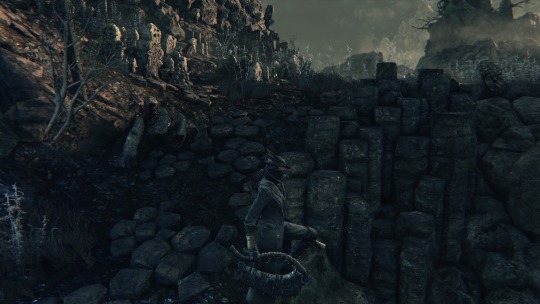
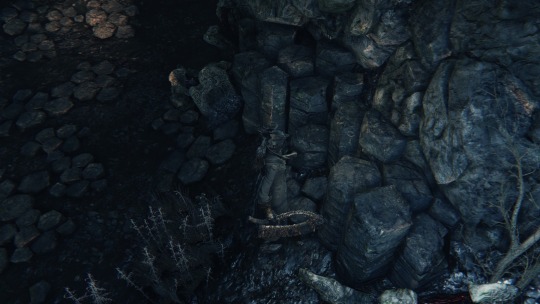
Well it is a real geologic structures! Also named volcanic (basalts) columns, organ pipes etc (orgues volcaniques in French)
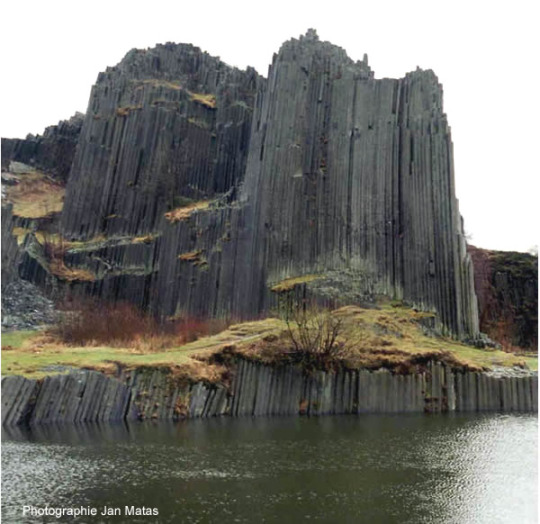
Volcanic columns of Panska skala. Source image : https://planet-terre.ens-lyon.fr/ressource/orgues-volcaniques.xml,
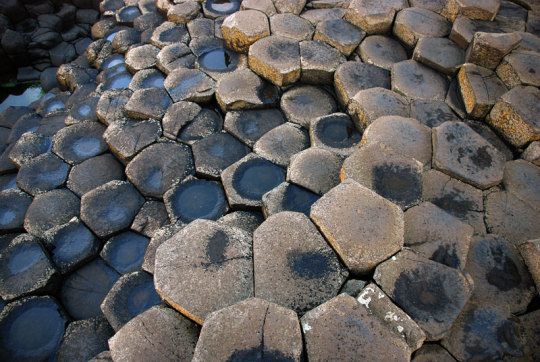
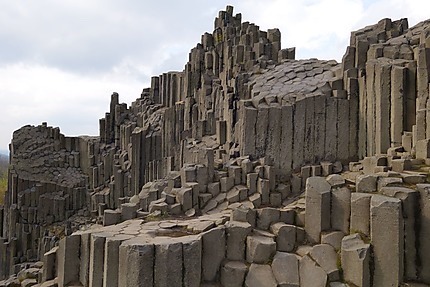

So, how it's formed? Well it is a bit complex but I will try to explain simply. You see those are formed from (effusive) volcanism (don't cofound with magmatic plutonism). You see when a volcano create really liquid lava and don't explode it's effusive. The lava cooled fast on the surface (huge thermic difference with the air or water) and don't crystallised, it often formed basalts (this black rock without minerals visible) or similars stone (can be andesite too in that case or even diorite. It's the same "family").
Those columns are not directly made on the surface but meters under the first couch of lava or they can be formed in magmatic veins that came from a magmatic chamber (in the ground) but cooled way faster than the chamber: it can create those or dyke or sills for exemple/ A magmatic chamber who cooled of will be crystallised on the contrary and take a lot of time! (Thousand if not millions of year) Still it's seems those columns take years or century to become rocks. Still it is "fast" on a geological levels.
Apparently with specific conditions temperature it create this hexagonal columns. It is also similar when clay who became dry and cracked on the ground if you prefer.
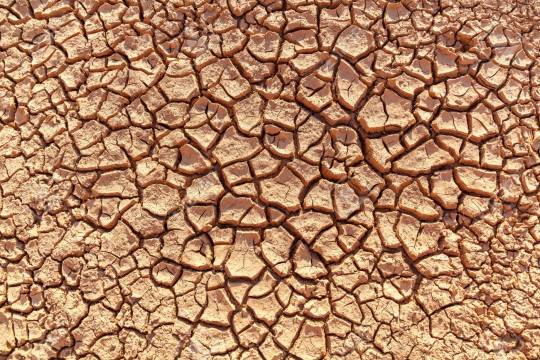
Anyway those volcanic columns can be found in many places! Europe, Africa, Asia, America etc There are usually millions of years old and we can see them thanks to erosions of the more tender rocks around it.
The first pic I show are at 80/100km north to Prague in Czech Republic. And You know Bloodborne is a bit more based on easter Europe so 👀
Anyway I think this is very cool the devs inspire themself from those! Very Interesting!
SO what it says about Loran region and Bloodborne world then ?🤔 Well I'm not sure but it's sure is very ancient geologic formation and even in XIX century 2 big theories fought about geology so it sure could be see as specials for old civilisation! Especially in link with old great ones or smt. And maybe Loran could be closer to Yharnam than we think.
ALSO
You see those weird ?ball rocks? in the all the nightmare area? really remind me of pillow lava. You know when lava pierce through the ocean and cold really fast
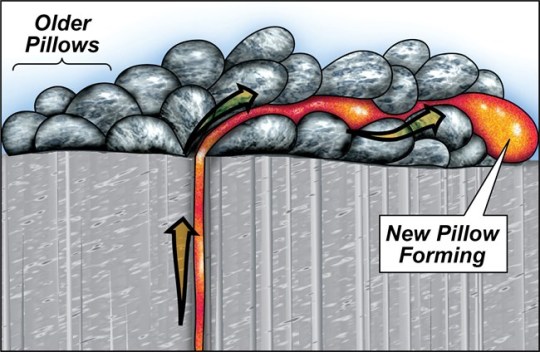
Ok and I'm not sure for Yharnam or Cainhurst geology but pretty sure the fishing hamlet is volcanic stone too. Why? Well the huge massifs black stones and the BLACK SAND, like in Hawaii ! Or in Iceland. Volcanic region with huge volcanic activity.


Black sand always means it came from volcanic rocks or that it's rich in iron minerals for exemple.
#bloodborne#bloodborne thoughts#bloodborne analysis#bloodborne theory#nightmare frontier#loran#fromsoftware#geology#I love geology in video games! my 2 passions!#volcanism#volcanic column
36 notes
·
View notes
Text
MORTIMER ADLER’S READING LIST (PART 2)
Reading list from “How To Read a Book” by Mortimer Adler (1972 edition).
Alexander Pope: Essay on Criticism; Rape of the Lock; Essay on Man
Charles de Secondat, baron de Montesquieu: Persian Letters; Spirit of Laws
Voltaire: Letters on the English; Candide; Philosophical Dictionary
Henry Fielding: Joseph Andrews; Tom Jones
Samuel Johnson: The Vanity of Human Wishes; Dictionary; Rasselas; The Lives of the Poets
David Hume: Treatise on Human Nature; Essays Moral and Political; An Enquiry Concerning Human Understanding
Jean-Jacques Rousseau: On the Origin of Inequality; On the Political Economy; Emile, The Social Contract
Laurence Sterne: Tristram Shandy; A Sentimental Journey through France and Italy
Adam Smith: The Theory of Moral Sentiments; The Wealth of Nations
Immanuel Kant: Critique of Pure Reason; Fundamental Principles of the Metaphysics of Morals; Critique of Practical Reason; The Science of Right; Critique of Judgment; Perpetual Peace
Edward Gibbon: The Decline and Fall of the Roman Empire; Autobiography
James Boswell: Journal; Life of Samuel Johnson, Ll.D.
Antoine Laurent Lavoisier: Traité Élémentaire de Chimie (Elements of Chemistry)
Alexander Hamilton, John Jay, and James Madison: Federalist Papers
Jeremy Bentham: Introduction to the Principles of Morals and Legislation; Theory of Fictions
Johann Wolfgang von Goethe: Faust; Poetry and Truth
Jean Baptiste Joseph Fourier: Analytical Theory of Heat
Georg Wilhelm Friedrich Hegel: Phenomenology of Spirit; Philosophy of Right; Lectures on the Philosophy of History
William Wordsworth: Poems
Samuel Taylor Coleridge: Poems; Biographia Literaria
Jane Austen: Pride and Prejudice; Emma
Carl von Clausewitz: On War
Stendhal: The Red and the Black; The Charterhouse of Parma; On Love
Lord Byron: Don Juan
Arthur Schopenhauer: Studies in Pessimism
Michael Faraday: Chemical History of a Candle; Experimental Researches in Electricity
Charles Lyell: Principles of Geology
Auguste Comte: The Positive Philosophy
Honore de Balzac: Père Goriot; Eugenie Grandet
Ralph Waldo Emerson: Representative Men; Essays; Journal
Nathaniel Hawthorne: The Scarlet Letter
Alexis de Tocqueville: Democracy in America
John Stuart Mill: A System of Logic; On Liberty; Representative Government; Utilitarianism; The Subjection of Women; Autobiography
Charles Darwin: The Origin of Species; The Descent of Man; Autobiography
Charles Dickens: Pickwick Papers; David Copperfield; Hard Times
Claude Bernard: Introduction to the Study of Experimental Medicine
Henry David Thoreau: Civil Disobedience; Walden
Karl Marx: Capital; Communist Manifesto
George Eliot: Adam Bede; Middlemarch
Herman Melville: Moby-Dick; Billy Budd
Fyodor Dostoevsky: Crime and Punishment; The Idiot; The Brothers Karamazov
Gustave Flaubert: Madame Bovary; Three Stories
Henrik Ibsen: Plays
Leo Tolstoy: War and Peace; Anna Karenina; What is Art?; Twenty-Three Tales
Mark Twain: The Adventures of Huckleberry Finn; The Mysterious Stranger
William James: The Principles of Psychology; The Varieties of Religious Experience; Pragmatism; Essays in Radical Empiricism
Henry James: The American; ‘The Ambassadors
Friedrich Wilhelm Nietzsche: Thus Spoke Zarathustra; Beyond Good and Evil; The Genealogy of Morals; The Will to Power
Jules Henri Poincare: Science and Hypothesis; Science and Method
Sigmund Freud: The Interpretation of Dreams; Introductory Lectures on Psychoanalysis; Civilization and Its Discontents; New Introductory Lectures on Psychoanalysis
George Bernard Shaw: Plays and Prefaces
Max Planck: Origin and Development of the Quantum Theory; Where Is Science Going?; Scientific Autobiography
Henri Bergson: Time and Free Will; Matter and Memory; Creative Evolution; The Two Sources of Morality and Religion
John Dewey: How We Think; Democracy and Education; Experience and Nature; Logic; the Theory of Inquiry
Alfred North Whitehead: An Introduction to Mathematics; Science and the Modern World; The Aims of Education and Other Essays; Adventures of Ideas
George Santayana: The Life of Reason; Skepticism and Animal Faith; Persons and Places
Lenin: The State and Revolution
Marcel Proust: Remembrance of Things Past
Bertrand Russell: The Problems of Philosophy; The Analysis of Mind; An Inquiry into Meaning and Truth; Human Knowledge, Its Scope and Limits
Thomas Mann: The Magic Mountain; Joseph and His Brothers
Albert Einstein: The Meaning of Relativity; On the Method of Theoretical Physics; The Evolution of Physics
James Joyce: ‘The Dead’ in Dubliners; A Portrait of the Artist as a Young Man; Ulysses
Jacques Maritain: Art and Scholasticism; The Degrees of Knowledge; The Rights of Man and Natural Law; True Humanism
Franz Kafka: The Trial; The Castle
Arnold J. Toynbee: A Study of History; Civilization on Trial
Jean Paul Sartre: Nausea; No Exit; Being and Nothingness
Aleksandr Solzhenitsyn: The First Circle; The Cancer Ward
Source: mortimer-adlers-reading-list
#reading list#long post#mortimer adler#text#saved posts#works#books#so much to read#philosophy#literature#dark academia#light academia
8 notes
·
View notes
Text
Brazil’s sinking city weighs on Latin America’s largest petrochemicals producer
Despite earlier payouts Braskem still faces legal action over geological disaster that forced tens of thousands to evacuate

All around the Pinheiro Baptist Church is abandonment. On either side of its white steeple stand houses and shops with bricked-up windows, no roofs and tropical vegetation sprouting.
“The cause was not divine,” says pastor Wellington Santos, whose chapel remains open in defiance of the desolation. “To this day, the language used is catastrophe, tragedy. And it’s not,” he adds. “It is a crime.”
What looks like the aftermath of a war zone is in fact an urban environmental disaster of allegedly man-made origin, which has forced an estimated 55,000 people to permanently evacuate their homes in the seaside city of Maceió, north-eastern Brazil.
The reason for the mass departures was slowly sinking soil, which triggered cracks in buildings and craters in roads. The blame has been placed — by an official geology agency, as well as locals — on decades of underground salt mining by Braskem, Latin America’s largest petrochemicals producer.
Since the problems first emerged in early 2018, some 14,400 properties have been condemned on safety grounds because of the risks of subsidence. The exodus has turned whole blocks in the capital of Alagoas state into virtual ghost towns.
Continue reading.
#brazil#brazilian politics#politics#environmentalism#environmental justice#mining#braskem#mod nise da silveira#image description in alt
29 notes
·
View notes
Note
Give me as much information about the super epic shark Megalodon as much as you can I need it for school for real!!!
Megalodon Facts!
Hi and thanks for your question! megalodon is pretty well known but here are some more obscure facts I found that will hopefully help!
Megalodon teeth were used by a variety of pre-contact cultures in North America. It is thought that they were valued artifacts and/or that they were modified to be used as weapons. Megladon teeth were mined from Chesapeake Bay and traded with other cultures nearby.
Megalodons used to be classified in the same genus as Great white sharks (Carcharodon) because of the similarities between their teeth. The current model is that Megalodon belongs to the Otodus genus and the similarities between its teeth and Great white sharks is a case of convergent evolution making them appear similar. They (megalodons and great white sharks) would still probably look somewhat similar based on how we have interpreted other ancient sharks and their similarity with modern lamnids such as great white sharks.
They were also widely distributed, with fossils being found all over the world. Based on where we have found megalodon teeth we can infer its tolerance of environmental temperatures is between 1-24 C (34-75 F). They where probably able to handle such cold temperatures because they were mesotherms. That is when an animal isn't quite an endotherm (able to create our own heat) but isn't an ectotherm (can't regulate their body temperature like most snakes for example). They had the ability to affect their body temperature via their metabolism but when the temperature in the environment is decreased their body temperature will also decrease. It is also thought that as body size increases in mesotherm animals there body temperature increases because of the square cube law. It is hypothesized that one of the reasons megalodon was so large. (you can read more in the article cited below).
Also megalodons have gone extinct no matter what the discovery channel says
Hope this helps!!
Sources bellow:
-------------------------------------------------------
papers:
Lowery, Darrin, et al. “INTEGRATED GEOLOGY, PALEONTOLOGY, AND ARCHAEOLOGY: NATIVE AMERICAN USE OF FOSSIL SHARK TEETH IN THE CHESAPEAKE BAY REGION.” Archaeology of Eastern North America, vol. 39, 2011, pp. 93–108. JSTOR, http://www.jstor.org/stable/23265116. Accessed 27 Feb. 2024.
Farrell, A. D. (A. D. ). A Use-Wear And Functional Analysis Of Precontact Shark Teeth Assemblages From Florida. no date. Florida State University, 2021.
Ferrón, Humberto G. “Regional endothermy as a trigger for gigantism in some extinct macropredatory sharks.” PloS one vol. 12,9 e0185185. 22 Sep. 2017, doi:10.1371/journal.pone.0185185
links:
8 notes
·
View notes
Text
ROCKS
Hello again fellow bloggers,
The most amazing thing about nature for me is the geology of an area. My main fixation in general is pollinators, as exemplified by my group's podcast, “What the Buzz?” and I love bees and ants and stuff like that. However, anytime I'm out hiking or just exploring, I can't help but get excited about rocks. The geology and topography of an area tell a story that goes back millions of years. For instance, down where I'm from in Nova Scotia there is a place called the Bay of Fundy, I'm sure you've all heard f it considering it is home to the world's highest tides. Down near a little village named Walton there is a shale beach with a massive cliff and folds in the rocks.
This cliff face tells the story of two landmasses colliding together to form what is now Nova Scotia. Initially happening long before the Atlantic formed. And then the Bay of Fundy itself formed from the rifting of North America from Africa and Europe. This caused the split in the mountain chain that now has pieces in Morocco, Scotland, the USA, Canada, and Norway!
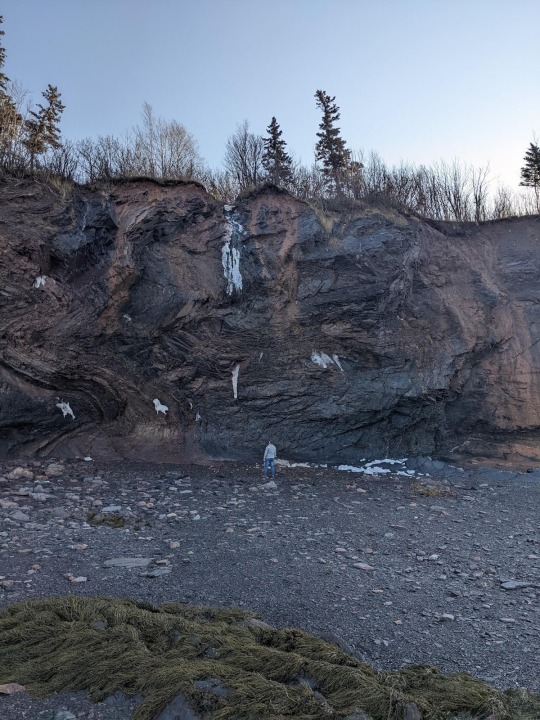
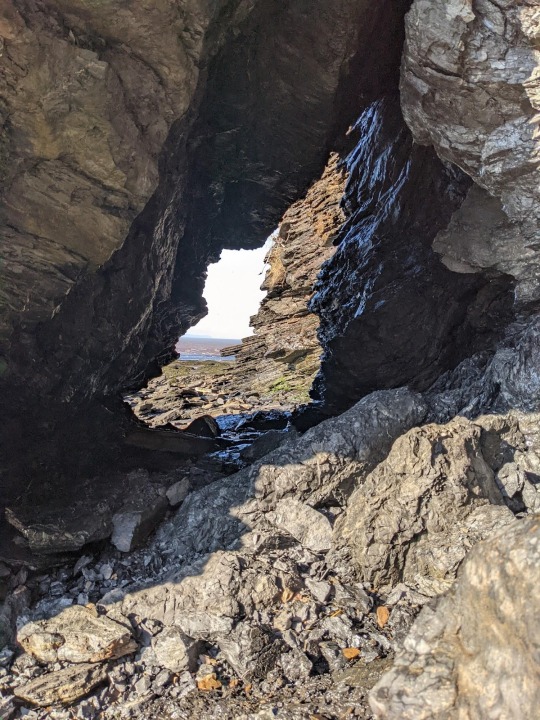
(pictures taken by me, Walton Cliffs)
A little closer to campus there is a location in Hamilton called the Devil's Punchbowl. I've gone there twice now for class field trips. The Devil's Punchbowl tells a story of the ancient seas and streams that used to run through this area of southwest Ontario. The grains of sand that make up the sandstone tell stories of millions of years ago. The dolomitic capstone of the Niagara Escarpment tells another story, so long as you speak the language of rocks and sediment.
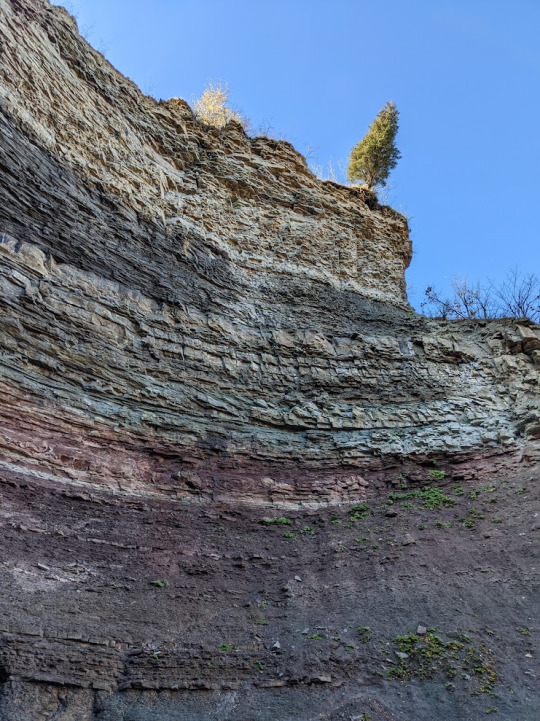
(another photo by me, Devils Punchbowl)
Another area of Nova Scotia I've hiked through is on the Cape Split Peninsula. This region of the province is located on basaltic bedrock which formed during the same event that formed the Bay of Fundy. Magma pours out of the earth to form the north mountain range which makes up the sea sideward side of the Annapolis valley. The cape is covered in rocks filled with copper ore speckled through basaltic rock. Based on the patterns and the lack of crystallization you can tell that this magma cools very quickly, likely due to a rushing in of seawater after the rifting event.
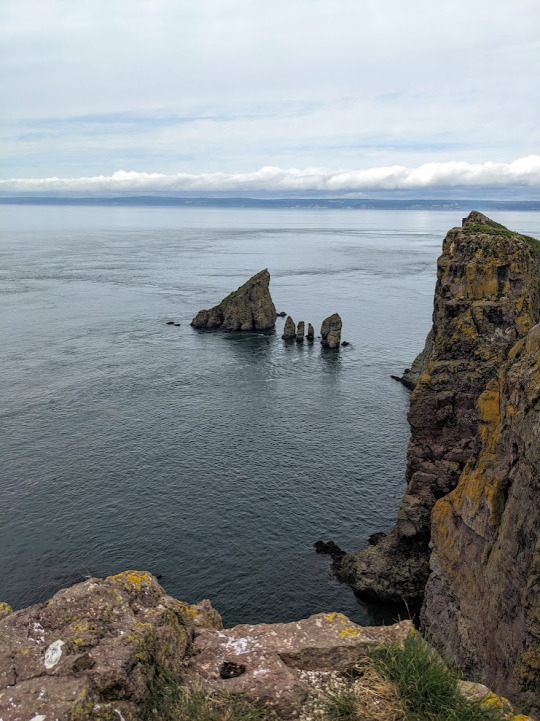
(another photo by me, Cape Split Point)
Further up the bay, there are a few islands, near Parrsboro, the indigenous peoples of the area, the Mi’kmaq, called these the five islands. The five islands are part of the legends passed down by the Mi’kmaq people. The story goes that Kluskap, or Glooscap as the settlers called him, who was a giant man, was fighting a giant beaver in the bay. During the fight, Kluskap hurled 5 large boulders at the beaver that formed the islands today, the beaver was said to have been trapped by the boulders and sticks causing him to turn into gold underground. Geologically these islands are exposed parts of the north mountain chain that I talked about earlier but it's neat learning about the indigenous peoples’ folklore, especially when centered around how the landscape was formed.
Anyways, till next week bloggers!
5 notes
·
View notes
Text

Decoding mysterious seismic signals
For the decades since their discovery, seismic signals known as PKP precursors have challenged scientists. Regions of Earth’s lower mantle scatter incoming seismic waves, which return to the surface as PKP waves at differing speeds.
The origin the precursor signals, which arrive ahead of the main seismic waves that travel through Earth’s core, has remained unclear, but research led by University of Utah geophysicists sheds new light on this mysterious seismic energy.
PKP precursors appear to propagate from places deep below North America and the western Pacific and possibly bear an association with “ultra-low velocity zones,” thin layers in the mantle where seismic waves significantly slow down, according to research published in AGU Advances, the American Geophysical Union’s lead journal. (The AGU highlighted the research in its magazine Eos.)
“These are some of the most extreme features discovered on the planet. We legitimately do not know what they are,” said lead author Michael Thorne, a U associate professor of geology and geophysics. “But one thing we know is they seem to end up accumulating underneath hotspot volcanoes. They seem like they may be the root of whole mantle plumes giving rise to hotspot volcanoes.”
These plumes are responsible for the volcanism observed at Yellowstone, the Hawaiian Islands, Samoa, Iceland and the Galapagos Islands.
“These really, really big volcanoes seem to persist for hundreds of millions of years in roughly the same spot,” Thorne said. In previous work, he also found one of the world’s largest known ultra-low velocity zones.
“It sits right beneath Samoa, and Samoa is one of the biggest hotspot volcanoes,” Thorne noted.
For nearly a century, geoscientists have used seismic waves to probe Earth’s interior, leading to numerous discoveries that would not be otherwise possible. Other researchers at the U, for example, have characterized the structure of Earth’s solid inner core and tracked its movement by analyzing seismic waves.
When an earthquake rattles Earth’s surface, seismic waves shoot through the mantle—the 2,900-kilometer-thick dynamic layer of hot rock between Earth’s crust and metal core. Thorne’s team is interested in those that get “scattered” when they pass through irregular features that pose changes in material composition in the mantle. Some of those scattered waves become PKP precursors.
Thorne sought to determine exactly where this scattering happens, especially since the waves travel through Earth’s mantle twice, that is, before and after passing through Earth’s liquid outer core. Because of that double journey through the mantle, it has been nearly impossible to distinguish whether the precursors originated on the source-side or receiver-side of the ray path.
Thorne’s team, which included research assistant professor Surya Pachhai, devised a way to model waveforms to detect crucial effects that previously went unnoticed.
Using a cutting-edge seismic array method and new theoretical observations from earthquake simulations, the researchers developed, they analyzed data from 58 earthquakes that occurred around New Guinea and were recorded in North America after passing through the planet.
“I can put virtual receivers anywhere on the surface of the earth, and this tells me what the seismogram should look like from an earthquake at that location. And we can compare that to the real recordings that we have,” Thorne said. “We’re able to now back project where this energy’s coming from.”
Their new method allowed them to pinpoint where the scattering occurred along the boundary between the liquid metal outer core and the mantle, known as the core-mantle boundary, located 2,900 kilometers below Earth’s surface.
Their findings indicate that the PKP precursors likely come from regions that are home to ultra-low velocity zones. Thorne suspects these layers, which are only 20 to 40 kilometers thick, are formed where subducted tectonic plates impinge on the core-mantle boundary in oceanic crust.
“What we’ve now found is that these ultra-low velocity zones do not just exist beneath the hotspots. They’re spread out all across the core-mantle boundary beneath North America,” Thorne said. “It really looks like these ULVZs are getting actively generated. We don’t know how. But because we’re seeing them near subduction, we think mid-ocean ridge basalts are getting melted, and that is how it’s getting generated. And then the dynamics is pushing these things all across Earth, and ultimately they’re going to accumulate beneath the hotspots.”
“What we’ve now found is that these ultra-low velocity zones do not just exist beneath the hotspots. They’re spread out all across the core-mantle boundary beneath North America,” Thorne said. “It really looks like these ULVZs are getting actively generated. We don’t know how. But because we’re seeing them near subduction, we think mid-ocean ridge basalts are getting melted, and that may be how they’re getting generated.”
The dynamics is pushing these things all across Earth, and ultimately, they’re going to accumulate against the boundaries of Large Low Velocity Provinces, which are compositionally distinct continent scale features beneath the Pacific and Africa, according to Thorne.
“They may additionally accumulate beneath the hotspots, but it is unclear if these ULVZs are generated by the same process,” he said. Determining the consequences of such a process will have to wait for future research.
IMAGE: Graphic illustration of Earth's interior. Credit Michael Thorne, University of Utah
5 notes
·
View notes
Text
2023 Reading Log pt. 14
Where the hell did November go?

66. New World Monkeys: The Evolutionary Odyssey by Alfred L. Rosenberger. In the introduction, the author laments that there aren’t any good books outlining the evolution and ecology of the New World Monkeys. If that's the case, there still aren’t. This book does alright by the ecology part—it has good summaries of the anatomy, behavior and feeding interactions of the covered monkeys. But the evolution is a mess. Rosenberger’s take on the evolutionary relationships between the animals covered here is iconoclastic, to say the least. He distrusts molecular phylogeny, uses synapomorphic characters that are basically just vibes, and has an entire chapter dedicated to lambasting the idea that any mammals could disperse across the Atlantic Ocean from Africa to South America (the consensus explanation) in favor of a hypothesized trek through Greenland and North America that has no evidence and still requires open ocean crossings. This was an incredibly frustrating experience to read, because there’s enough good content among the dross that I didn’t want to just abandon it.

67. Seaweeds of the World by John H. Bothwell. The weakest of Princeton University Press’ “X of the World” series. For one thing, the subtitle is usually “A Guide to Every Family”, whereas here it’s “A Guide to Every Order”. The book’s general coverage of seaweeds is pretty good—it explains why “seaweed” is a polyphyletic category but still useful in common English, explains the anatomy and the complex life histories of seaweeds. But the actual coverage of groups is lacking. Again, it doesn’t cover every family. And it’s more interested in seaweeds of economic importance than it is in their actual ecologies. Plus the writing is just kinda boring. This is the first entry in this series I do not recommend.

68. Lapidarium: The Secret Lives of Stones by Hettie Judah. Now this is more like it! This book is a series of short essays about stones and their cultural impact. I’m a sucker for cultural histories in general, and this is a very good one. I especially liked that it doesn’t just cover gemstones, as I originally expected, but also stones used in art and architecture, resources like coal, and the use of earthworks in religion. The focus is much more on the culture than the geology, but the book does discuss things like deposition of sediments and how metamorphic rocks yield gemstones in explaining why certain places have certain rocks. The book is also lovely to look at, with minimalist bands of color along the sides of the pages in the hues of the stones covered in that chapter.

69. Monsters and Monarchs: Serial Killers in Classical Myth and History by Debbie Felton. I was excited for this one. I had read Felton’s chapter in Monster Anthropology, which suggested that Greek traveler’s tales about werewolves and the murderous robbers encountered by Theseus in myth were both expressions of cultural fears about serial killers. Unfortunately, that article already covered the bulk of Felton’s actual argument and evidence, and this book is those 20 pages fluffed to 200. The only other really good material is some coverage of the distinction between Greek and Roman attitudes towards law and order, and what “counted” as murder in each society. The rest of it is handwaving and extrapolation from very little data, with just about every instance of mass killing that we have records of, from political uprisings to court intrigue, being taken as the work of a possible serial killer. Plus, the author is a Freudian, so we have to hear about coded references to rape and sexual violence in stories where there really aren’t any. Sometimes a bed where you get your legs cut off is just a bed.

70. Cult of the Dead: A Brief History of Christianity by Kyle Smith. They say you can’t judge a book by its cover, of course, but that title and that cover made an instant sale for me. I’m glad it did, too, because this is a good one. An explanation of the importance of martyrdom to Christianity, it does an excellent job of explaining why, exactly, so many people were willing and eager to die for their faith, and how this persisted in building a persecution complex among the dominant European religion for centuries. The book avers from discussing the present day for the most part, tapering off with the work of reformist Catholics poring over the many, many legends about saints and trying to determine which, if any of them, represent actual historical events rather than religious fictions. Other topics covered include the trade in relics, the role in martyrologies in shaping the modern calendar, and how women could most easily play a role in the Church through the mortification of the flesh. The book is eminently readable and very well illustrated.
#reading log#christianity#comparative religion#seaweed#classical mythology#classical greece#classical rome#new world monkeys#evolution#ecology#geology#cultural history
8 notes
·
View notes
Text

“Technocracy Will Rebuild World,” Vancouver Sun. December 10, 1932. Page 1 & 2. --- 4-HOUR DAY; 4-Day Week; 660 HRS. A YEAR ---- SOCIAL CHANGES URGENT ---- NORTH AMERICA'S GREAT CHANCE --- MORE AMAZING REVELATIONS OF 'THE DAWN OF A NEW ERA' ==== Technocracy declares that North America is equipped today to lead the world into a new era.
"Where man for the first time in his progression from the jungle is the conqueror in the battle for leisure."
Here are its sweeping and tremendous conclusions, as told by Wayne W. Parrish, writing in Alfred E. Smith's magazine, New Outlook.
"Man, in his age-long struggle for leisure and the elimination of toil, has finally arrived at that position where, for the first time, this goal is not only possible, but probable.
"With what is known of technology today in this country, it is now necessary for the adult population, ages 25 to 45, to work but 660 hours per year per individual to produce a standard of living for the entire population ten timer above the average income of 1929."
The downward decline since the fall of 1929 has never once abated, and Technocracy has predicted in no uncertain terms the greatest social wreck of all time unless this decline is halted, or controlled. It is simply the example of an ox-cart driver attempting to pilot an airplane. There is little time to learn to use the controls to avert a crash.
This is no plea for 'social justice,' no scheme for a Utopian realization of the humble rights of all men. It is a necessity. For the first time, in history, as a result of the technological advance we have achieved an economy of plenty in the midst of a hodge-podge of debt and unemployment. The plain fact is that the machine and men cannot both work on a rarity basis any longer. The machine has pushed man out of work. There isn't room for him any more. Instead of being a cause for remorse this should he the most joyful proclamation in history. Let the machine do man's work for him. Let him have leisure. Of course the entire social structure must be changed. Why not? But again, it is not a matter of choice. Technology has brought our present system to its doom. There is no way out except by fundamental revision.
Certain it is that the impact of technology on our price system has proved the futility in the future of stocks, bonds, savings, equities, mortgages and all concomitants of our past system.
This is no mere "business cycle." Technocracy maintains that America is at the close of an era, and the actual ending is dependent only upon the length of time artificial stimulants can be injected. At the best, the time is short. The day of reckoning is growing nearer every week.
While employment has been decreasing the U. S. has increased its debt load to above $218,000,000,000 by shoving present responsibilities off to the future.
Technocracy (energy survey of North. America) is an integration of physics, chemistry, geology, geophysics, thermo-dynamics, zoology, biophysics, biology and physiology.
At the present downward rate we will have 25,000,000 unemployed by 1934.
Technocracy's yardstick, applied to North America, reveals that communism, facism, socialism and other political systems are entirely inadequate to cope with the needs of a new state of civilization.
WHERE IT BEGAN Technocracy began in 1918 with the study by a group of engineers of the advance in machine production during the war. Technocracy foresaw the present unemployment of 14,-000,000 in North America, and foresaw the depression which would accentuate unemployment.
Technocracy began as a study, but it has become "the logical expression for a technological energy state."
It has, says Parrish, earned its place in the history of the human race along with democracy and autocracy. Here in broad terms is the definition:
AUTOCRACY Rule by the individual. DEMOCRACY Rule by the people. TECHNOCRACY Rule by skill or science. It is a tremendous picture Parrish draws. And here are some of the arresting statements in his dynamic and stirring story of "the end of an era."
Here, in the words of Parrish, is how the machine, "the really big technological mechanism that makes entire industries automatic, has changed the whole face of the social complex.
It has now made possible, and necessary, the elimination of much of man's toil.
It has made invalid every old social, political and economic postulate now in use.
It has rendered political systems useless.
It has sounded the death knell of old methods of exchange.
It has shelved permanently the necessity for private enterprise and savings.
It has made sterile the moral concepts of the virtue of labor.
By the pervasive force in changing man's whole outlook upon life, it has opened the way for the greatest release of the no-called human values in history,
It has provided the way for the elimination of individual greed and the enjoyment of leisure by everyone.
Today, says Parrish, the members if Technocracy number 350 and are located in all parts of the world. Only during the last month, the number of otherwise unemployed draughtsmen -and engineers who are doing the research and plotting hundreds of charts has been raised from thirty-six to one hundred.
They are being paid by the Architects' Emergency Relief Committee of New York, and are housed at Columbia by Professor Walter Rautenstrach, who is a member of Technocracy.
INTO THE NEW ERA Man will, as usual, have to adjust himself to the new era, he cannot refute it for long, argues Parrish.
At no previous time, on no other continent, has there existed such a peculiar complex of energy and natural resources as exist on the North American continent. In the words of Howard Scott:
"It is the only continental area of the world's surface manned, equipped and ready to move civilization into the new era where man for the first time in his progression from weakness to conqueror in the battle for leisure.'
"This is no plea for "social justice," no scheme for Utopian realization of the humble rights of all men. It is a necessity.
"For the first time in history as a result of the technological advance we have achieved an economy of plenty in the midst of a hodgepodge of debt and unemployment.
"The plain fact is that the machine and men cannot both work on a parity basis any longer. The machine has pushed men out of work. There isn’t room for him any more. Instead of being a cause for remorse this should be the most joyful proclamation in history. Let the machine do man's work for him. Let him have leisure. Of course the entire social structure must be changed. Why not?
"But again, it is not a matter of choice. Technocracy has brought our present system to its doom. There is no way out except by fundamental revision.
WHY NORTH AMERICA LEADS Then, in a swift survey of the world, Parrish tells why he regards North America as the continent to lead the world out of the old and into the new. And he emphasizes that he speaks of. North America in an economic sense, with no Canada and U. S. boundary involved. He says:
"Russia, with its much-vaunted Communism, is but a slight variation of the American price system when placed under an exacting light. With 92% of its population tillers of the soil, with meagre technical facilities and "more musicians than technologists," as Mr. Scott expresses it, Russia found itself in the position of being compelled to inaugurate an industrial era under a Communistic price system of production with insufficiently developed energy resources and inadequate personnel."
'VALIANT BATTLE' "From the viewpoint of Technocracy, England is fighting a valiant but losing battle. Among the futile gestures which probably will be made will be complete, abandonment of monetary currency and current banking credit, and stringent preferential tariffs and purchasing agreements to lessen the disparity which exists in its international balance of world trade."
"Fascist Italy is in much the same situation. It possesses insufficient water power and almost no Iron, copper, coal, oil and gas, but is offering bonuses to further increase its already dangerous population overload.
"Fascism –“ a last ditch defense of a price system against the oncoming army ef social change," is only able to maintain itself temporarily in Italy by the importations of foreign materials and energy resources for which it is still able to pay.
"Of other nations or continents little needs to be said. Asia is hopeless as far as a high energy civilization is concerned. There aren't the resources available. You can't take more coal out of the ground than is actually there.
"Australia has very few resources. It has almost no opportunity for further development.
"South America is greatly lacking in many essential resources.
"If all Europe were combined into one unified energy state, a high standard of living could be obtained for all the peoples there, but language and nationalism, present almost insurmountable barriers at present.”
"Japan has attempted to operate a highly mechanized society under great handicaps. With limited resources and a high population density, she is reaching out to Manchuria for aid, but there is little there to help her. LONG LIFE PRODUCTS Here are some things Parrish cites as the potential products of technology, which show the necessity of control:
Razor blades which would last a lifetime...
Ramie plant which would outwear and outserve wool or cotton.
An automobile that would go 300,000 miles without an overhaul.
Shoes that would wear two and a half years without repair.
"If the comparatively new fibrous nettle plant, ramie, is introduced to industry (and eventually it will be) the entire wood pulp, silk, wool and cotton industries would be very seriously affected. “Ramie has a 22-inch fibre, can be raised 1,500 pounds to the acre (compared to 450 pounds of cotton) and two or three crops can be obtained in a year in the southern states. There is no problem of pick ng, since it can be cut and bound with a thresher.
"If made into two suits, it wears seven times as well as wool, and several hundred times better than cotton. It has the advantageous property of being stronger when wet than dry. It can be made into paper cheaper than wood pulp and the paper can't be torn by the human hand. It has a lustre similar to silk and linen, can be woven with silk and rayon or wool and cotton, and takes dyes beautifully."
"The technologist is able to produce an automobile that would really be of service. Designs are all complete for a machine that would have a Hickman or a boat-type bottom. Individual wheel suspension, exposed steel parts that would not rust, frictionless bearings throughout, and would have an average life of 300,000 to 350,000 miles without a general overhauling."
SHOES 2/12 YEARS "Shoes? It's the same story over again. The technologists can produce leather today that is waterproof and has a wearing quality that would make an average pair of shoes wear two and a half years. But our shoe industry, running way under capacity as it is, could supply the nation with a ten years' supply of these shoes within a period of eight or ten months. Believe it or not, the shoe industry has a capacity of 900,000,000 shoes per year. Where is the market?"
MANLESS MACHINES And his answer to public works, such as highways, to provide work:
"A machine Is already developed and waiting for a public works market that, with two men operating It per shift, or six men for each twenty-four hours, can tear up an old road or street, lay foundations for pavement, and put on the pavement sixty-feet wide, at the rate of eight miles a day!"
"Keep such developments out? It is impossible under the price system, for a primary requisite of a price system is that production costs be cut, and more efficient machinery. Is the best way to cut costs.
"A factory for the production of rayon yarn is nearing completion in New Jersey. Its operation is entirely mechanical and production can be carried on without a single worker in the plant. By means of photo-electric cells it will be possible for an official In New York to change dyes without leaving his desk and without human assistance at the plant.
"The technological advance of thirty years has now made. It possible for a man to eliminate much of his toil. In doing so it has doomed the entrepreneur and the entire system of selling for price.
"Egypt Assyria, Greece, and Rome led the world in their days. "The past is thick with Empires dust." A new continent is able to take its position in the leadership of the civilization of tomorrow. "Technocracy poses that question."
What Technocracy Means Technocracy has literally burst upon the world. It is the rule of skill or science, the fixing of a higher plane of living, made possible by technology and the machine.
Boys and girls, with their life ahead of them, will read it with an absorbing Interest. It is their hope.
Men and women will see it as the outcome of the condition which they helped to create, and to which the world can now fit itself.
Thousands of copies have been distributed, in compact form, of previous interpretative articles and editorials from The Vancouver Sun on Technocracy. Thousands more have been minted and are available at The Sun Office for all who wish them. Editor.
#vancouver#technocracy#technocratic government#the great depression#planned economy#economic crisis#capitalism in crisis#planisme#government by engineers#useless hands#mechanization#man machine#birth of the technocratic state#politics of chaos#great depression in canada#regulating capitalism
3 notes
·
View notes
Text
The Avengers: Earth Mightiest Heroes & X-Men Evolution series watch
Some Assembly Required written by Sebastian Montes
The supervillain Mandrill is jumping around the city causing trouble but is stopped by the Wasp. Iron Man, Thor, Ant-Man, and Hulk. Meanwhile, a stowaway is confronted by sailors on a cargo ship. Black Panther defeats them and jumps ship into the night.
Pepper meets with Hulk, while the others are late. Iron Man gives them a guided tour, and Pepper hands out the Avenger ID cards. Bruce warns Hulk that after the Avengers have caught the escaped prisoners, they’ll turn on him. Meanwhile, Hank Pym works on his prototype Ultron head and Jan moves into the Avengers Mansion.
The Enchantress prowls the Mansion, hexing JARVIS, and assumes Bruce Banner's form. JARVIS issues a warning to Thor that an intruder is interfering with the security, and Thor suggests that Hulk and he patrol the Mansion. Hulk leaves in a huff, and Pepper convinces Thor to go after him to bring him back. Thor and Hulk fight in Central Park.
Nick Fury speaks with Stark about the team and says supports Avengers but people are uneasy with super-powered heroes. Tony is dubious about Fury's claims suspecting Shield really just wants more control in the situation.
Stark gathers the Avengers to deal with Hulk who is under the Enchantress's spell. Iron Man and Thor find out and Banner breaks the spell. Hulk flees. Iron Man is attacked by the Executioner. Avengers battle Enchantress and Executioner.
Hulk and Banner discuss the Hulk's existence. Hulk rejoins the battle to save Giant-Man. Enchantress fails to regain control of the Hulk and is defeated. but the Executioner manages to escape with her unconscious body by using his powers to manipulate time and space.
After the fight, the Hulk quits, claiming that the Enchantress was right. He leaps away, and the Avengers return to the mansion. The Black Panther is keeping a watchful eye on the mansion. Meanwhile, the Hulk heads towards the Arctic north where Captain America's shield is shown to be trapped in the ice.
Well, I really like this episode. Everyone has been introduced and the team has been formed so so it the characters can finally lean back a bit and interact with each other.
I really love the contrast between Janet and Hank, with Janet's enthusiasm for being a hero and Hank's but science tho. They're both really adorable in this.
This is weird to say but the Hulk and Bruce also have an interesting relationship in this with Hulk animosity but also trust in Bruce. Bruce basically is Hulk's conscience. Unlike the movies these two can interact with each other which adds an interesting element.
Amora get to be pretty cool in this episode. Showing that she is just as sneaky and cunning as the best of them and she gets to use her magic in a fun way in the fight.
Turn of the Rogue written by Greg Johnson and Rick Ungar
The X-men are training in the Danger Room when to Cyclop's surprise he finds that Rogue is part of the simulation. He stops the program and asks Xavier why he added Rogue to the training simulation, Xavier tells him that he added her as an element of surprise, something they will need to get used to on their missions. Scott later tells Jean he doesn't like using Rogue's images as an enemy because he still thinks there is a chance that Rogue may join their side. Mystique overhears their conversation and Darkholme informs Rogue of what happened and tells her that their no chance that the X-men would ever truly want to befriend her.
Later, Jean and Scott were preparing for a school trip, but Darkholme manipulated things to make Jean lose her spot, and Rogue took her place instead. While they were riding the bus, heavy snow caused it to skid off the road and come to a halt. Rogue then suggested riding snowmobiles to caves during the storm, and she even challenged Scott to a race. The teacher gives a geology lecture to students in a cave. Rogue wanders off, followed by Scott. She asks what he wants. He wants to be friends. She demands the truth, asks if she's a target for the X-Men, and mentions the battle simulation with her as the enemy. Scott says she's been lied to and can join them. She refuses and starts to leave. A student approaches, revealing themself as Mystique. She taunts them, shoves Scott off a ledge, and tells him that Xavier is hiding the truth. Rogue confronts Mystique, demanding no more secrets. She uses her power to see Mystique's memories and sees that Mystique was deceiving her into thinking that the X-men were attacking her.
Scott landed on a ledge and Rogue was able to hop down and pull him up Mystique tried to drop a boulder on Scott and Rogue, causing them to fall into the river. Scott saves them from going over a waterfall, but he hits his head. Rogue apologized for what she had done.Xavier, Wolverine, and Storm have been alerted to the danger and fly towards the mountains in the Blackbird to try to find Scott. Scott and Rogue trying their best to avoid Mystique get stuck on a narrow bridge that nearly collapses before the X-men arrive. On the jet, Rogue hesitates to choose sides, but Wolverine assures her that she won't be thrown off. She takes their side and is welcomed by the X-Men. Later, the young mutants confront Xavier about Mystique. Rogue says honesty is important. Xavier promises to be more open with them.
Professor Xavier has a robot of a teenage girl and that's all I can think about. That wasn't a hologram in the danger room Xavier just had a robot of Rogue made and I don't know how or why.
In start contrast to EMH this show so far put emphasis on character based drama. It all been pretty good so far. I'm using on the side of Cyclops is a boring character but changing the settings and making him younger actually helps his character shine a bit. It lets his interactions with the others be personable and giving him that concept of he's growing into his role makes him more interesting.
Mystique can turn into animals in this show and I can't remember if that's a thing she can do in the comics. If so that puts her on the top tier considering this can allow her to fly.
With the bug shake up of rogue joining the X-Men and the reveal of Mystique's identity I'm looking forward to the next episode
3 notes
·
View notes
Text
South Saskatchewan
Next morning, I was super-efficient in packing up and left sharp at 7.45am (I've become even better at early departures in the Rockies, simply to avoid the crowds 🥴) as I had a long drive to do; over 600km to my next camping spot... Not sure I completely had thought this through when I booked it, but think I was lured by the 1-hour jump back in time when crossing into Saskatchewan, although the actual driving time stays the same of course!! 🤔
First Gmaps direction; turn left in 361km.... love it, those large-distance roads in Canada! 🙃 I was now officially on the Red Coat Trail but different to other provinces, I never saw any plaques or tourist info signs so I still don't really understand what it's about... I presume something with the army traveling west during the new frontier?? Now, it's just endless fields and sky which are pretty in their own right... Although I love my trees and forests, there's something special about this massive expanse of agricultural lands, a testament to human's ability to control the land. I did feel cheated, as the "Land of Living Skies" was yellow-grey both below and above the horizon with smoke turning everything dull... such a shame! On the way, there's really not much to see apart from the rare sunflower field 🤩, modern-day grain stores, cows and surprisingly lots of nodding donkeys that pump oil from the ground!
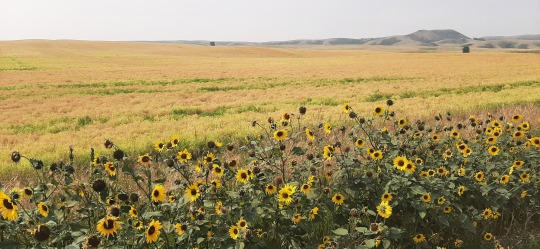


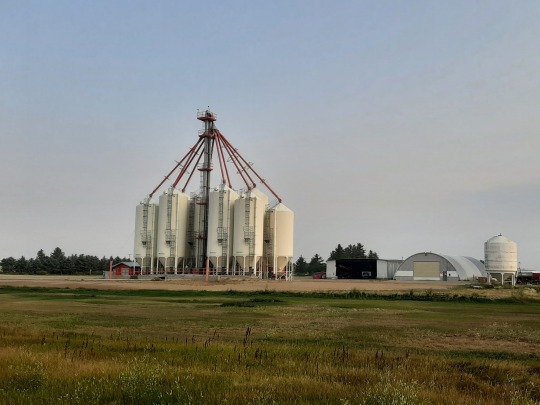

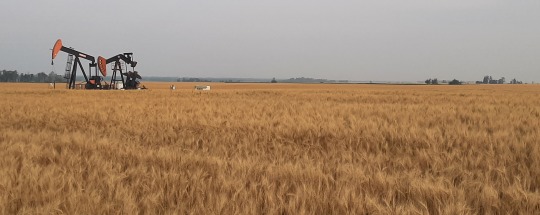
Close to half-way the province, I veered further south towards the US border onto gravel roads to see Castle Butte, a 200ft-high knoll left in the landscape during the Ice Age (not sure I trust that info, as I thought buttes are of volcanic origin). Looming high above the flat prairie land I tried to climb up it (where other people already were so I was not completely stupid yet) but it got too steep for my non-hiking shoes and then instead of coming down on my butt as I should have, I tried to walk it and ended up running at full speed down the slope... I got really extremely lucky I didn't fall and break any/all body parts!! 😳😳 I did end up semi-twisting both ankles which I still feel 2 weeks later, but instead of complaining I am grateful that that was the worst of it! Phew...


The adventures of the day didn't stop with that because a bit later I ran over and killed a duck! 😫 With lots of dark skid marks on the gravel, I only realized too late that there were 4 full-sized ducks sitting in the middle of the road and although I braked as much I safely could, I had no choice than to go over them and hope they all fit between my wheels... 3 survived (likely with a heart attack!) and one didn't. I've had very little roadkill in the 20+ years driving, and definitely nothing as big as this so that was quite upsetting!
My mood improved however when I arrived at Grasslands National Park, which consists of two blocks some 170km apart; the east block that I visited first protects a vast expanse of badlands, whereas the west block where I was camping that night represents Canada's largest tract of untouched native prairielands (which covered most of North America's central region until the settlers came ranching & farming). I'm trying not to overkill with pictures but both areas were very very pretty and I would urge anyone to make a trip out here!
On the east side, there's a few hikes but it was so hot that I simply drove along the Badlands Parkway with interpretative signs explaining the geology and the natural & human history of the area. The badlands seem at first glance quite monotone but then I discovered flowers, prickly pear cacti, gophers (ground squirrels of which I had already spotted lots on the road) and even a pronghorn antilope!
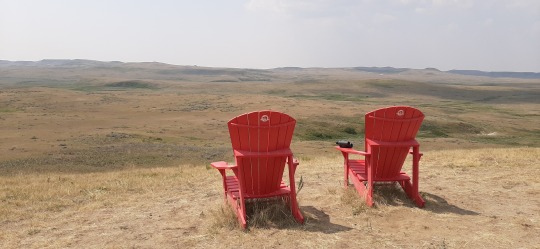
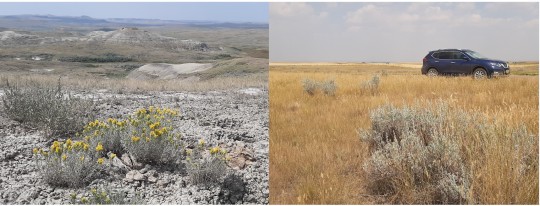

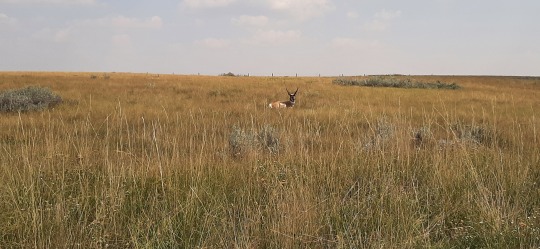
The clouds pushed by the wind kept changing the light patterns, highlighting in turn different hills, so it was great to sit for a while in a red chair and see the scenery constanly change.

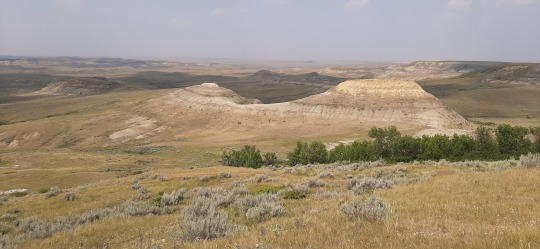

Hot and tired, I made the trek to the other block passing enroute another grain elevator, after which I set up camp on the beautiful prairie without a single tree (with a fence though to protect against the bison)! My pic of the sunset doesn't do it justice, but you can imagine how pretty the sky was, and as this is a dark sky preserve, I stayed up late (after midnight, which doesn't happen often anymore 😜) to watch the Milky Way in its full glory.
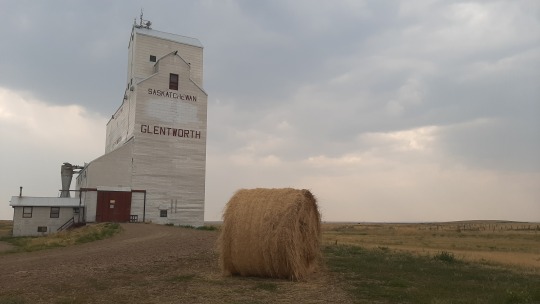

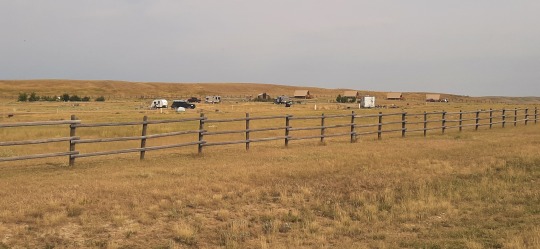
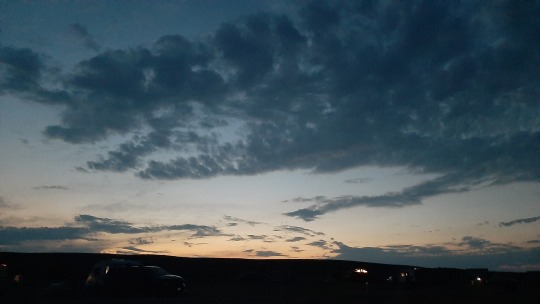
The next morning, I had a clear task; prairie dog and bison hunting, which are the two key species of the park. A gopher (top left pic) had already been running all morning around my site (he shouldn't have built his hole next to the firepit), so when I spotted the first prairie dog (top right pic) in one of the park's colonies or "dog towns" I was a bit confused as they looked the same to me! 😂 Turns out the prairie dogs are about twice the size and much more afraid of humans, although they loved eating the dead bugs from my car bumper and tires 😍 which meant that although it was impossible to get up close while walking as the first prairie dog would bark to warn the entire colony and then all disappeared, they had no problem with the car being close to them... funny how humans impact nature in weird ways sometimes!
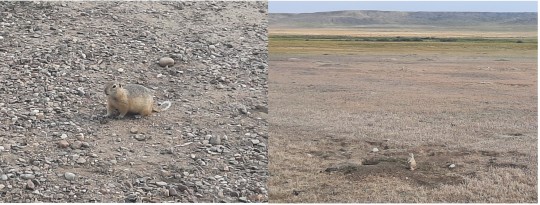
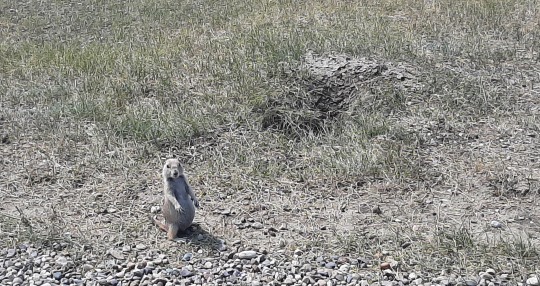
The bison were more elusive, as they truly don't like people, and although a herd of 500 of them is maintained in the park (with surplus animals being exported to other parks for reintroduction), the enclosed area is so large for them to roam in that they have plenty of places to hide. So I slowly made my way through the park with my binoculars on hand, learning along the way about a homestead that had managed to ranch cattle for a few years but then had to abandon because it was simply too hard to survive on the barren land, the different native grasses that make up the prairieland, a bison rubbing rock and a stone tipi ring, all the while enjoying the views.
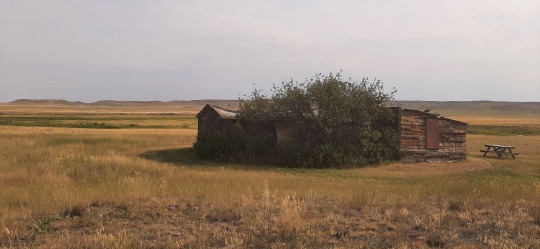

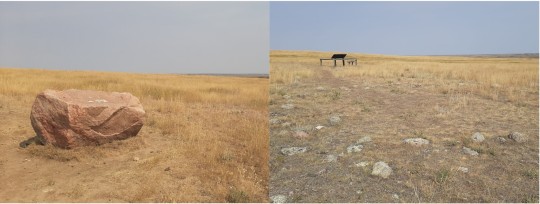
And then finally, when I had given up and was enroute to the village to get gas, I first saw a lone bison chugging through the grass, and then at the outermost corner of the enclosure, suddenly there was a group of 40 bison, including a few calves, that were grazing and rolling in the dirt. I promise I could see them much clearer in my binoculars than the little black specks in the picture! 😁

By the time I got to the village a massive rainstorm broke out so good reason to drop by the visitor centre and confirm it was a golden eagle (much bigger than bald eagles) that I had seen on a pole. I first didn't understand the gas "station" set-up as you needed to pull some levers to get it going, but finally managed to fill up the car once more.
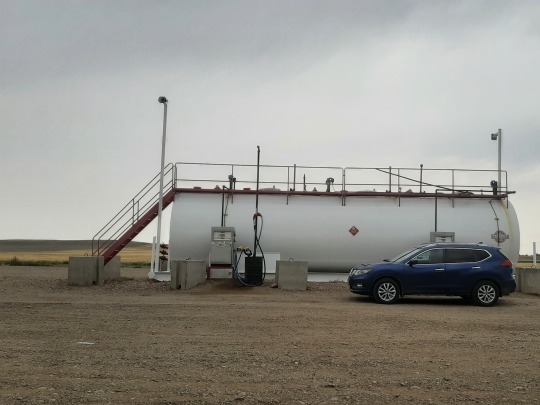
That evening, the skies blackened suddenly with a thunderstorm and the wind was so strong that the tent started sliding away (the neighbour's did blow away) so I threw in as many stones I could find, parked my car in front of the tent to form a bit of a windshield and waited it out in the car... no way I was going to stay in the tent on this flat land! Luckily the storm passed quite quickly after which I had a drink with my neighbours to laugh it out, but I did end up sleeping in the car (for the first time and quite comfortably!) as rain came & went with some more lightning in the night.
When I drove off in the morning towards the Alberta border, I finally got the promised Living Skies Land with blue skies and golden fields, seeing the Prairies in all its hues 😊 I also saw another (the same??) herd of bisons on the way out of the park as well as another smaller golden eagle and several antelopes 😍
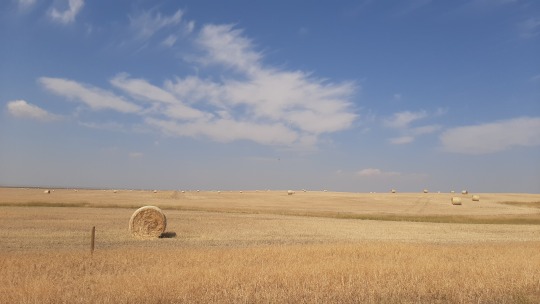
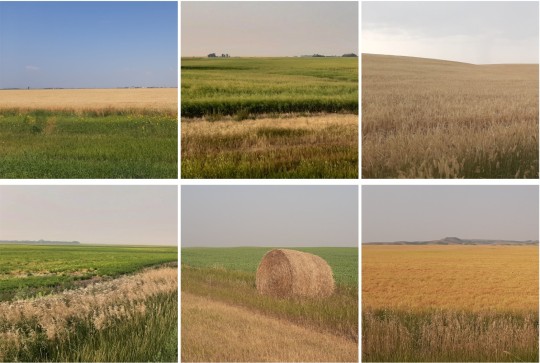
After a relatively short drive, I arrived at the Cypress Hills Interprovincial Park, which straddles the border between Saskatchewan and Alberta, consisting again of two blocks. Although I had planned again to visit the eastern block first and camp in the western one, a staff member pointed out that I was actually staying in the eastern block so that saved me another 1.5 hours drive! 👍 The park is unfortunately not very natural and has been developed as a resort with mini-golf, golf course, swimming pool etc so I was a bit disappointed. The nature that there is, is being protected because it's on a hill standing 500m above the plains so it was not glaciated and has therefore unique plant life (including trees) that doesn't occur anywhere else in the region but they haven't done a good job at protecting it! I had great internet at a viewpoint so ended up sitting on a bench there for 4 hours booking my next set of accommodations 😃 while occasionally hearing loud grunting lower on the hill which I presume was an angry moose so I didn't have any urge to go explore further!
Next day, I would be driving into Alberta, so this was Saskatchewan for now until I return further north on my way back. Adieu!

Wildlife: 1 coyote & 1 deer (Red Coat Trail), 100+ ground squirrels (gophers), 100+ prairie dogs, 43 bison in the afternoon and 50 bison in the morning, 2 golden eagles, 2 ferruginous hawks, 1 deer, 5 pronghorn antilopes (Grasslands), 3 red-tailed hawks & 3 deer (Cypress Hills)
SUPs: none
Hikes: no real ones, just lots of little sidetrips to viewpoints
Distance driven since the last map (I'm losing track of the weeks 😉 but it's been a while all the way from Sleeping Giant): 1,925 km
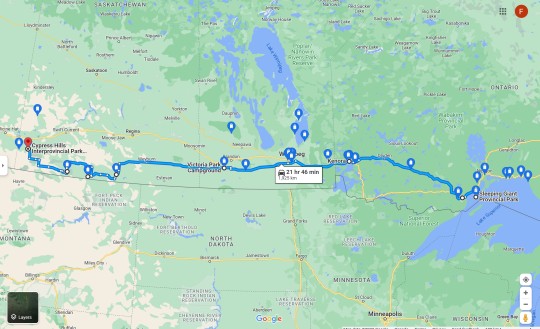
3 notes
·
View notes